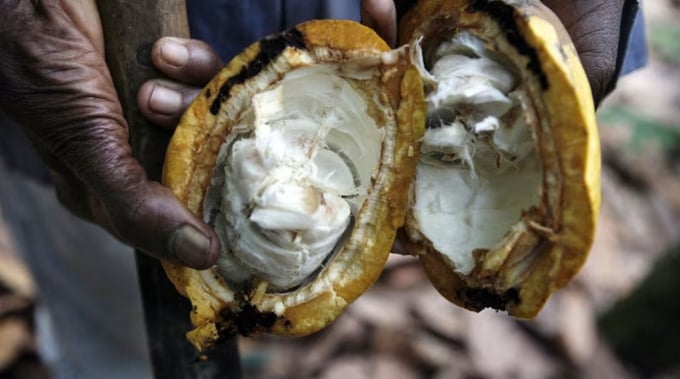June 16, 2025 | 00:16 GMT +7
June 16, 2025 | 00:16 GMT +7
Hotline: 0913.378.918
June 16, 2025 | 00:16 GMT +7
Hotline: 0913.378.918

Poor weather and disease have devastated crops in Ghana and Ivory Coast, where two-thirds of the world’s cocoa beans are grown.
Cocoa futures fell for the sixth day in a row on Thursday, the longest run of losses since 2022, as improved weather in the main growing region in west Africa takes the heat out of a record price surge.
The most active futures contracts in New York tumbled 5.6 per cent to $7,361 a tonne, and its London equivalent lost 10.3 per cent to £7,010 a tonne, as rising hopes that crops in Ghana and Ivory Coast may recover in the coming season trigger a sell-off.
“The years long bull market in cocoa may have finally ended as prices fell by enough to trigger our risk-management liquidation rules,” said Eric Crittenden, chief investment office of Standpoint Asset Management, in his latest monthly update.
Cocoa futures in New York and London doubled in value to record highs this year, with New York prices surpassing $12,000 a ton in April as poor weather and disease devastated crops in Ghana and Ivory Coast, where two-thirds of the world’s cocoa beans are grown, and hedge funds piled into the market.
The two west African countries, which set prices for farmers and sell forward contracts to traders to deliver the beans, also failed to meet orders for hundreds of thousands of tonnes of beans.
Carlos Mera, head of agricultural commodities at Rabobank, said that this year’s price peaks had been driven not only by “shockingly low” crops in west Africa but also the fact that “more cocoa had been sold than there was in existence”.
Years of low prices have meant cash-strapped farmers have been unable to invest in improving ageing plantations.
Mera said that Ghana had produced only 500,000 tonnes of the 800,000 tonnes it had contracted to sell to the world’s big food processors, and the remainder had to be rolled over for delivery to the next season. As the price rose, “many physical buyers had to buy back their short hedges”, he added.
But he said the market was expecting to see “some recovery” in Ghana and Ivory Coast’s crops after the arrival of the seasonal rains. New plantations in countries such as Ecuador would also help meet global demand, he said.
As the price drops from April’s record high, hedge funds have reduced their bets on the bull market continuing. Net long positions fell to 25,675 contracts in New York in the week ending June 18, compared with 70,661 in late January, according to data from the US Commodity Futures Trading Commission.
However ADM Investor Services, a UK brokerage, said that “the crop is not out of the woods yet”.
“The trade is awaiting the results of the pod counting surveys, which will come later this summer,” said Mark Bowman, an analyst at ADM.
He added that Ivory Coast’s weekly tally of fresh crop arrivals was still falling. It totalled 15,000 metric tonnes for the week ending June 23, down from 25,000 the previous week and 30,000 a year ago.
(FT)

(VAN) Extensive licensing requirements raise concerns about intellectual property theft.

(VAN) As of Friday, a salmonella outbreak linked to a California egg producer had sickened at least 79 people. Of the infected people, 21 hospitalizations were reported, U.S. health officials said.

(VAN) With the war ongoing, many Ukrainian farmers and rural farming families face limited access to their land due to mines and lack the financial resources to purchase needed agricultural inputs.

(VAN) Vikas Rambal has quietly built a $5 billion business empire in manufacturing, property and solar, and catapulted onto the Rich List.

(VAN) Available cropland now at less than five percent, according to latest geospatial assessment from FAO and UNOSAT.

(VAN) Alt Carbon has raised $12 million in a seed round as it plans to scale its carbon dioxide removal work in the South Asian nation.

(VAN) Attempts to bring down the price of the Japanese staple have had little effect amid a cost-of-living crisis.